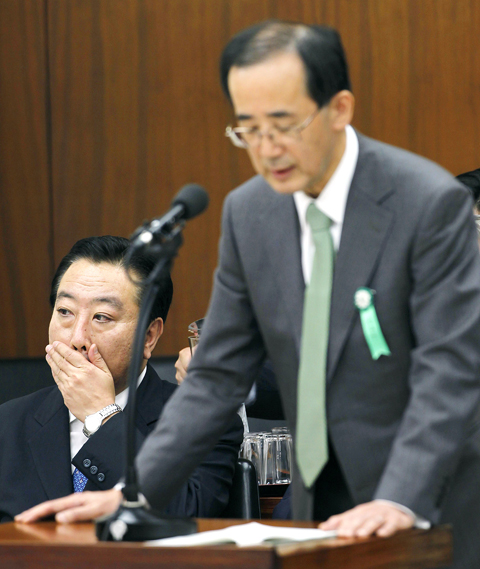Japanese Finance Minister Yoshihiko Noda said yesterday the government was closely monitoring China’s ramped-up buying of Japanese government debt and would check with Beijing on its motives.
“We are paying close attention” to recent increases in Chinese purchases of Japanese government bonds [JGBs], Noda said during a session of the upper house financial affairs committee, Dow Jones Newswires reported. “I don’t know the true intention” of China regarding its growing appetite for JGBs.

PHOTO: REUTERS
CLOSE COOPERATION
However, Tokyo plans to “closely cooperate [with Beijing] and examine its intention,” he said.
China bought ¥583.1 billion (US$6.9 billion) of Japanese bonds in July, Japan’s finance ministry said on Wednesday, as the Asian giant continued to ramp up purchases of Japanese debt.
The figure was higher than the ¥456.7 billion worth of securities purchased in June.
The news came after the yen hit a fresh 15-year high against the US dollar on Wednesday. Currency traders say China’s buying of yen-denominated assets, while too small on its own to sharply push up the yen, could be bolstering the currency indirectly.
BUYING UP DEBT
For the first half of the year, China bought ¥1.73 trillion of debt, nearly seven times the full-year record of ¥253.8 billion set in 2005.
In May alone, Chinese investors bought a net ¥735.2 billion in Japanese government bonds.
China has sought to diversify its vast investments away from the US dollar and Europe since the onset of the financial crisis. Most of the bonds bought by China are thought to be used by the government to manage its foreign reserves, which surged to a record US$2.454 trillion at the end of June.
The reserves, already the world’s largest, grew 15.1 percent from a year ago, the People’s Bank of China said on its Web site.

MORE VISITORS: The Tourism Administration said that it is seeing positive prospects in its efforts to expand the tourism market in North America and Europe Taiwan has been ranked as the cheapest place in the world to travel to this year, based on a list recommended by NerdWallet. The San Francisco-based personal finance company said that Taiwan topped the list of 16 nations it chose for budget travelers because US tourists do not need visas and travelers can easily have a good meal for less than US$10. A bus ride in Taipei costs just under US$0.50, while subway rides start at US$0.60, the firm said, adding that public transportation in Taiwan is easy to navigate. The firm also called Taiwan a “food lover’s paradise,” citing inexpensive breakfast stalls

TRADE: A mandatory declaration of origin for manufactured goods bound for the US is to take effect on May 7 to block China from exploiting Taiwan’s trade channels All products manufactured in Taiwan and exported to the US must include a signed declaration of origin starting on May 7, the Bureau of Foreign Trade announced yesterday. US President Donald Trump on April 2 imposed a 32 percent tariff on imports from Taiwan, but one week later announced a 90-day pause on its implementation. However, a universal 10 percent tariff was immediately applied to most imports from around the world. On April 12, the Trump administration further exempted computers, smartphones and semiconductors from the new tariffs. In response, President William Lai’s (賴清德) administration has introduced a series of countermeasures to support affected

CROSS-STRAIT: The vast majority of Taiwanese support maintaining the ‘status quo,’ while concern is rising about Beijing’s influence operations More than eight out of 10 Taiwanese reject Beijing’s “one country, two systems” framework for cross-strait relations, according to a survey released by the Mainland Affairs Council (MAC) on Thursday. The MAC’s latest quarterly survey found that 84.4 percent of respondents opposed Beijing’s “one country, two systems” formula for handling cross-strait relations — a figure consistent with past polling. Over the past three years, opposition to the framework has remained high, ranging from a low of 83.6 percent in April 2023 to a peak of 89.6 percent in April last year. In the most recent poll, 82.5 percent also rejected China’s

PLUGGING HOLES: The amendments would bring the legislation in line with systems found in other countries such as Japan and the US, Legislator Chen Kuan-ting said Democratic Progressive Party (DPP) Legislator Chen Kuan-ting (陳冠廷) has proposed amending national security legislation amid a spate of espionage cases. Potential gaps in security vetting procedures for personnel with access to sensitive information prompted him to propose the amendments, which would introduce changes to Article 14 of the Classified National Security Information Protection Act (國家機密保護法), Chen said yesterday. The proposal, which aims to enhance interagency vetting procedures and reduce the risk of classified information leaks, would establish a comprehensive security clearance system in Taiwan, he said. The amendment would require character and loyalty checks for civil servants and intelligence personnel prior to